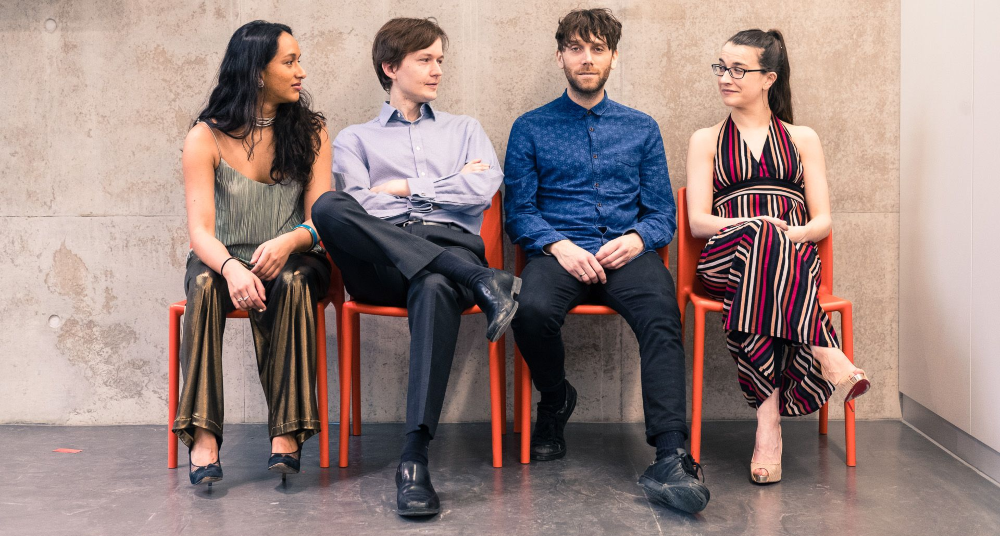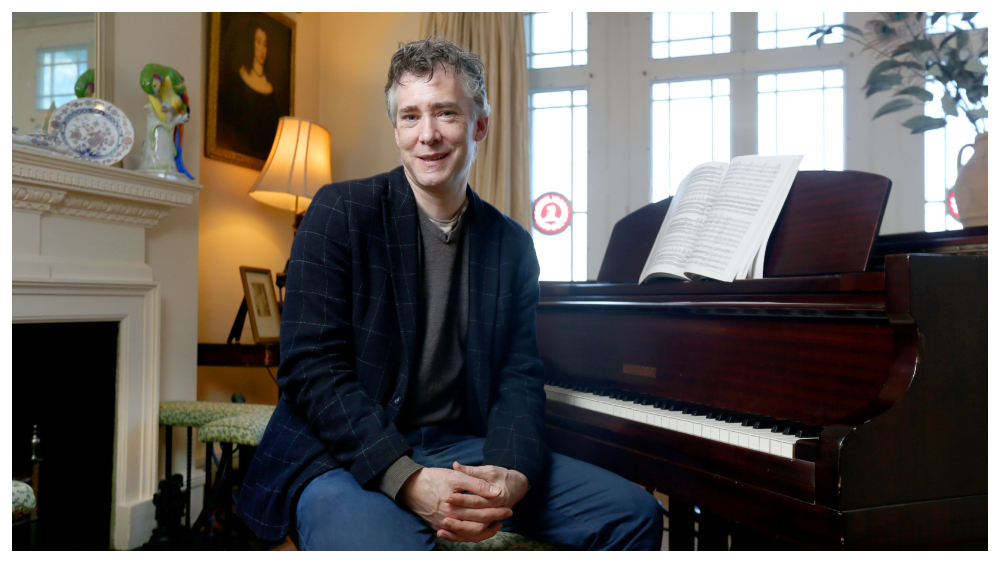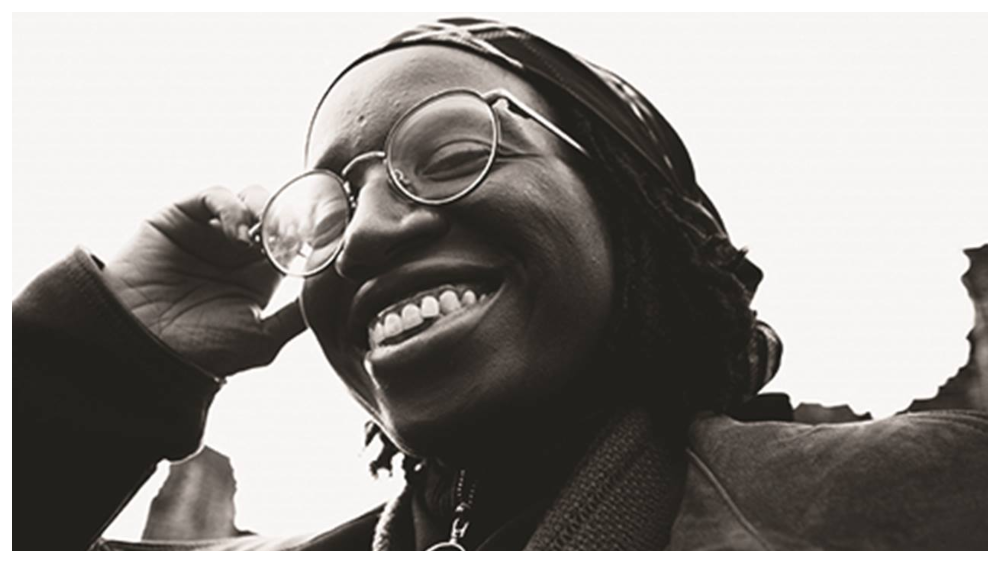PRS for Music, in collaboration with the Ligeti Quartet, announced an online concert for its latest virtual event. Filmed at Goldsmiths University of London’s George Wood Theatre, the concert premiered on Tuesday 27 April at 7.30pm on PRS for Music’s website and YouTube channel.
Originally due to take place in 2020, during a year of celebration for the Ligeti Quartet, who have been at the forefront of contemporary music for over a decade since their formation in 2010, the concert has been re-designed for the current climate to deliver an inspiring and memorable evening for those watching from home.
Ahead of the event, M caught up with Ligeti Quartet violist Richard Jones to discuss the Quartet’s contemporary reputation, the shift to online shows and the inspiration around the upcoming concert.
'This showcase is a look back at some of our other favourite pieces which were written for us over that time. All the composers come from quite varied musical backgrounds so it’s a snapshot of some of the different kinds of things we’re excited by.'
Hi Richard. Can you tell me how the Ligeti Quartet was formed?
We met around the time of all of us finishing college in 2010 - we were all at different places (RAM, RCM, Oxford University) but we heard about each other through the grapevine as people that all wanted to be involved in new music.
Our first rehearsal was at RCM and I went to the library and brought loads of modernist repertoire for us to sight-read through, one of which was Ligeti’s second quartet. Everyone thought I was a bit nuts (there probably aren’t many pieces in the quartet repertoire with more notes than that piece) but they gave it a go! I actually think the group willingness to try it out was one of the things which made us believe that we could work together. That piece gained a sort of Holy Grail status for us - being able to perform it properly one day became our mission, and we found ourselves using the name Ligeti Quartet, which stuck.
I also feel that György Ligeti’s open-minded/non-dogmatic approach to pushing the boundaries of what music could be, and taking inspiration from music of all times and places, is at the heart of what we believe in.
The Ligeti Quartet has established a reputation for performing contemporary music – how do you choose the repertoire you play?
It will normally start with deciding on one piece that we’d really like to perform or a composer we’d really like to work with and the build programmes around that. We all do quite a lot of listening and ‘nerding out’ looking at scores. Then you discover other pieces which seem to fit in some way and often you find some sort of common thread or theme emerging.
All of us came from backgrounds of wanting to present music in unusual ways: Val dressed up as the pioneering cellist Guilhemina Suggia for her final Masters recital at the Academy for example! We’ve all always been quite interested in composition and arranging at different times in our lives (more so since the pandemic, with fewer/no gigs in the diary) so perhaps our own experiences mean we empathise with the struggle of composers!
Ligeti Quartet exists to support composers at all levels, and we like to be involved from the earliest stages of the composition, often quite a long time before any notes are written. We’re interested in developing ideas for pieces alongside composers and we enjoy the process being as collaborative as possible.
'I think all musicians say that performing to an empty hall is quite a unique challenge and one we hope we don’t have to get used to.'
How have you found the shift to online concerts in recent months? Has it made you think differently about how you perform?
Yes, I think you have to accept that you’ll be working harder for people’s attention - your audience is no longer captive in the concert hall. We have definitely been planning shorter programmes and to a certain extent shorter pieces for online-only concerts.
I think the immersive feeling of losing a sense of time that you get in the best live experiences is very hard to recreate. But if you are lucky enough to work with an experienced videographer (as we did for our PRS for Music showcase with the brilliant Tim Hand) and have multiple camera angles and good sound, it can be really worthwhile. We were keen to record ‘as live’ as much as possible for this and not worry too much about perfection in the way you do a studio recording.
I think all musicians say that performing to an empty hall is quite a unique challenge and one we hope we don’t have to get used to. That being said, I do hope that in the future a live stream option will remain for people that can’t get to concerts for whatever reason. But yeah, we miss audiences for sure.
We’ve also launched our Workout! Scheme - performing 100 new pieces in online workshops across 2020-21. We’ve almost hit the 50 mark and there are two more submission dates on 1 July and 1 September - so any emerging composers reading this should apply.
So you are presenting a concert with PRS for Music later this month, what was the inspiration for this programme?
It’s kind of a 10-year celebration concert for us! 2020 was our anniversary year, and we’d been planning some special events but of course they never really happened in the end. Although we did release our album Songbooks Volume 1 (music by Christian Mason and Tanya Tagaq) which is something we’d been working on for a long time and are very proud of.
So this showcase is a look back at some of our other favourite pieces which were written for us over that time. All the composers come from quite varied musical backgrounds (electronic, jazz and soul, heavy metal… oh and ‘classical’ of course!) so it’s a bit of a snapshot of some of the different kinds of things we’re excited by.
What should listeners look forward to hearing?
Lots of things! Barbershop howling dogs, Jamaican folk (mento) and cello percussion, spacey drones, Duke Ellington, a ‘Spellsphere’, pounding synths, a little tiny bit of singing (but not too much don’t worry!)
Find out more about the concert, featuring works by Shiva Feshareki, Ben Gaunt, Laura Jurd, Robin Haigh, Anna Meredith and Ayanna Witter-Johnson.





